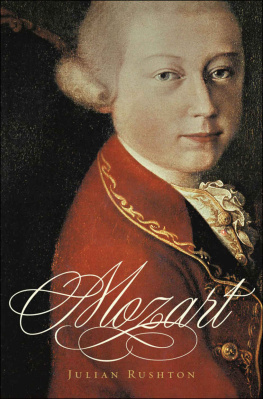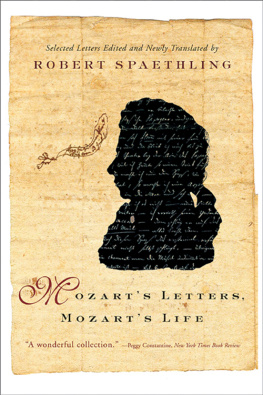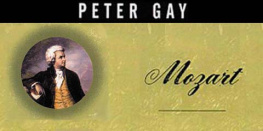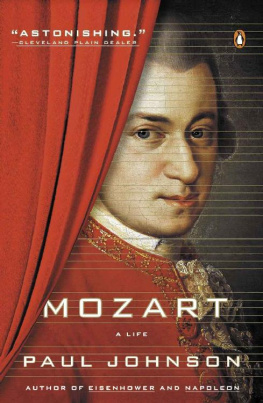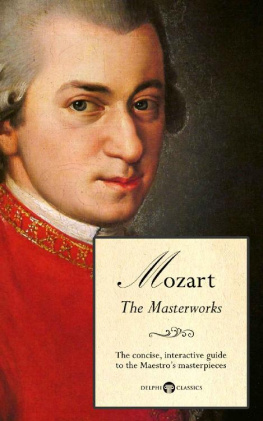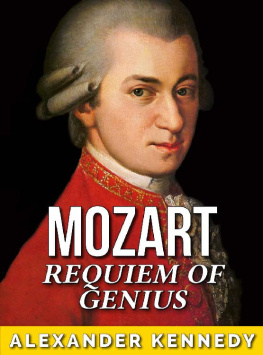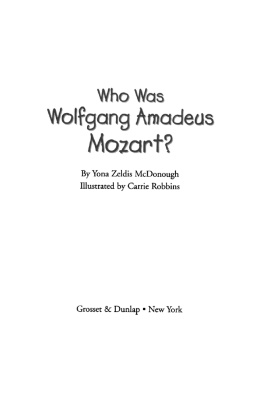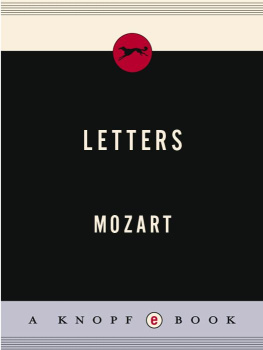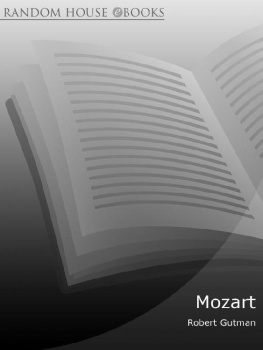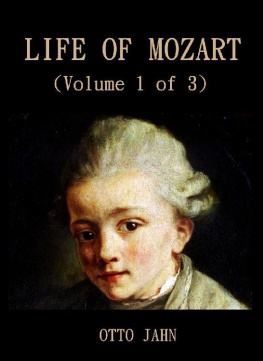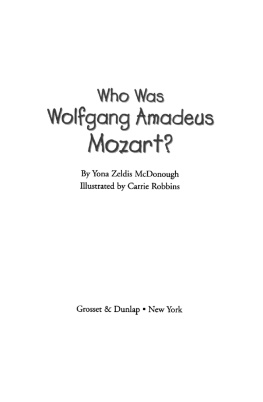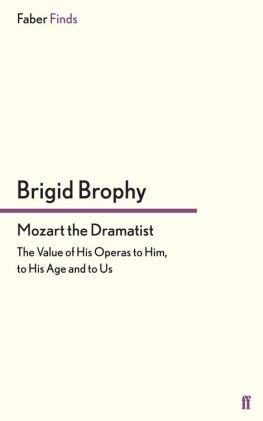THE MASTER MUSICIANS
MOZART
Series edited by Stanley Sadie
THE MASTER MUSICIANS
Titles Available in Paperback
Berlioz Hugh Macdonald
Brahms Malcolm MacDonald
Britten Michael Kennedy
Chopin Jim Samson
Handel Donald Burrows
Liszt Derek Watson
Mahler Michael Kennedy
Mendelssohn Philip Radcliffe
Monteverdi Denis Arnold | Puccini Julian Budden
Purcell J. A. Westrup
Rossini Richard Osborne
Schumann Eric Frederick Jensen
Richard Strauss Michael Kennedy
Tchaikovsky Edward Garden
Vaughan Williams James Day
Vivaldi Michael Talbot |
Titles Available in Hardcover
J. S. Bach Malcolm Boyd
Beethoven Barry Cooper | Musorgsky David Brown
Schtz Basil Smallman |
THE MASTER MUSICIANS
MOZART
Julian Rushton


Oxford University Press, Inc., publishes works that
further Oxford Universitys objective of excellence
in research, scholarship, and education.
Oxford New York
Auckland Cape Town Dar es Salaam Hong Kong Karachi
Kuala Lumpur Madrid Melbourne Mexico City Nairobi
New Delhi Shanghai Taipei Toronto
With offices in
Argentina Austria Brazil Chile Czech Republic France Greece
Guatemala Hungary Italy Japan Poland Portugal Singapore
South Korea Switzerland Thailand Turkey Ukraine Vietnam
Copyright 2006 by Oxford University Press, Inc.
Published by Oxford University Press, Inc.
198 Madison Avenue, New York, NY 10016
www.oup.com
Oxford is a registered trademark of Oxford University Press
All rights reserved. No part of this publication may be reproduced,
stored in a retrieval system, or transmitted, in any form or by any means,
electronic, mechanical, photocopying, recording, or otherwise,
without the prior permission of Oxford University Press.
Library of Congress Cataloging-in-Publication Data
Rushton, Julian.
Mozart / Julian Rushton
p. cm.(The master musicians)
Includes bibliographic references and index.
Contents: Salzburg and the grand tour : 175669Works by an almost supernatural talentItaly: 176973Opera seria : fitting the clothes to the figureSalzburg: 177477Sacred music: I have thoroughly acquainted myself with that style since my youthMannheim and Paris : 177779The classical style : Mozart and the keyboardSalzburg and Munich : 177981Orchestral music : the glorious effect of a symphony with flutes, oboes, and clarinetsVienna : 178185Singspiel : music must never offend the earPiano concertos and chamber music in the land of the clavierVienna and Prague : 178688Chamber music : the greatest composer known to meOpera buffa : most important is that it must be really comicThe last years : 178891The last works : a rich possession, but even fairer hopesde morte transire ad vitam.
ISBN-13: 978-019-518264-4
ISBN-10: 0-19-518264-2
1. Mozart, Wolfgang Amadeus, 17561791Chronology. 2. ComposersAustriaBiography. I. Title
II. The master musicians series.
ML410.M9R87 2006
780. 92dc22
[B] 2005021058
Illustrations of insert courtesy of the Internationale Stiftung Mozarteum (ISM).
1 3 5 7 9 8 6 4 2
Printed in the United States of America
on acid-free paper
Contents
Pitch Notation
Preface
MOZART WAS PROLIFIC; HE DIED WHEN NOT QUITE THIRTY-six, but his essentially adult compositions span two-thirds of that short life. His works fall readily into categorieschamber, orchestral, church, or dramatic musicand the shorter units that make them up can usually be classified as variations, fantasias, sonata forms, rondos, arias, ensembles, finales. He had habits; no one could have written so much in so short a time without them. He adopted conventions more than he adapted them, and was certainly no reformer. But as he developed, in his middle years (from his late teens), each of his works becomes increasingly individualised rather than merely representative of a type. This must stand as an assertion; a book of this length cannot include the style analysis of his contemporaries necessary to support it. Nor, considering his life, can I report more than briefly on what we know of his lifestyle, beliefs, income and, most controversial of all, the cause of his death. I can only state what I believe on present evidence to be the case. There is no space for opera plots, and many favourite works receive no more than a passing mention. The works that are discussed are not immune from specific criticisms, for Mozart no longer needs an advocate before an uncomprehending world. For musical examples, I have tried to select passages to illustrate specific points, rather than for the pleasure of seeing them in print yet again. There are longer biographical and musical studies, and handbooks on individual works, but even these may be silent or reticent on aspects of, say, Don Giovanni or Die Zauberflte that some feel to be of paramount importance, and others of transcendent beauty. The works themselvesnot only the operasappear inexhaustible, inspiring new insights that change their meaning with the passing of time.
My objective has been to supply an introduction and guide to Mozarts output, usable for reference, with the appendices (calendar, worklist, and personalia) usual in the Master Musicians series. The structure of the book But nobody would take the slightest interest in Mozarts or his wifes illnesses, his debts, his relationship with his fatherstill less would anyone have invented love-affairs for him, and theories of his being poisonedif his music did not compel attention to the man behind it. Conscious of my dependence on the scholarly work of many others, I hope to direct readers to some of the fascinating wealth of Mozartian literaturefirst, his music, but also what has been and is being written about it.
My debt to Mozart is not measurable, but is hereby acknowledged. I owe my love of his music to my parents, whose bookshelves housed a far-from-new Grove, and writings by Tovey, whose account of the piano and wind quintet (a work we could almost play en famille) fascinated me at about the age Mozart composed Mitridate. Several authors of literature on Mozart I am glad to count among valued friends and colleagues; other than Cliff Eisen and Dorothea Link, to whom a special thank you, I will not enumerate them, as they know who they are, but I am grateful to them all, as to others with whom I am less acquainted and some who, alas, are dead. I dedicate this work to the memory of four British Mozartians I feel honoured to have known: Bernard Williams, Alec Hyatt King, Alan Tyson, and the former editor of this series, who died just before I had the chance to submit any of my script for his scrutiny, Stanley Sadie.
Golcar, 2005
Julian Rushton
Abbreviations
Letters and contemporary documents
Letters are referred to by date and can variously be found in the comprehensive original-language publication, Bauer, Deutsch, and Eibl, Mozart: Briefe und Aufzeichnungen; and translated into English, the large selection, including many of Leopold Mozarts, in Emily Anderson, The Letters of Mozart and His Family, and a smaller selection, not quite complete even for Mozart himself, in Robert Spaethling,
Next page
